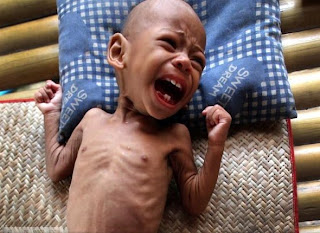
Photo: UNICEF
As food prices continue to skyrocket, necessities such as milk, vegetables and meat never find their way into many families’ homes, placing 500 million children at risk of malnutrition. Thus children’s physical and mental growth will be stunted over the next 15 years, according to a survey by the international charity Save the Children. Eighty percent of stunted children reside in only twenty countries, and half live in just five countries: India, Bangladesh, Peru, Pakistan and Nigeria. Save the Children’s survey (which was conducted in the aforementioned five states) found that one third of parents surveyed claimed that their children complained about not having enough to eat.
In the report, A Life Free from Hunger: Tackling Child Malnutrition, released this month, Save the Children stated that one in four of the world’s children have stunted growth – meaning their body and brain have failed to develop properly due to malnutrition. Malnutrition in early childhood is detrimental as it can begin as early as fetal development brought on by the malnourished mother. Once a child is chronically malnourished, stunting begins, and once it sets in, the effects most often become permanent and often fatal. Stunted children usually do not recover the loss of height and most will never gain the needed corresponding body weight. A stunted child also tends to average an IQ fifteen percent lower than their nourished counterparts. Stunting can lead to premature death, as the vital organs never fully develop. The prospects for stunted children is bleak: many never survive childhood. The report states that malnutrition is a contributing factor in the deaths of 2.6 million children every year.
In a year of record high global food prices, child malnutrition has only increased and could hurt the progress made in recent years towards reducing the number of nutrition-related child deaths. According to Save the Children chief executive Justin Forsyth, “the world has made dramatic progress in reducing child deaths, down from 12 to 7.6 million, but this momentum will stall if we fail to tackle malnutrition” (BBC). A 2008 series of reports by The Lancet: Maternal and Child Undernutrition, showed that over 1/3rd of childhood deaths, and 11% of diseases worldwide, are directly caused by maternal and child malnutrition. Therefore it is clear that the global community and individual states must act to see that the needs of 500 million children are met, and end this crisis before the lives of more children are lost and the stability of future communities further declines.
In order to end undernourishment in children, we must also focus heavily on prenatal and postnatal care and nutrition for mothers, as this is the starting point for a lifetime of undernourishment and disease or a lifetime of health and prosperity. Often mothers are unaware of how their nutrition and health can affect the life of their unborn child thus prenatal education and nutrition programs are a major key to continued progress. However, nutritional education cannot end there. Often families are uneducated on the effects of nutrition as a whole and issues such as exclusive breast feeding for the first six months and feeding their children from the basic food. Children are not always undernourished due to extreme poverty; how often or much they are fed also plays a significant factor. In a recent report on Madagascar, the country’s high rates of stunting were shown to have been heavily impacted by harmful feeding practices. The 2008-09 Madagascar Demographic Health Survey found that half of all Malagasy children under five are stunted, the sixth highest rate of stunting in the world, according to the UN Children’s Fund (UNICEF). “We found that the highest occurrence of stunting is not among the very poor, as they eat the vegetables that they grow instead of selling them, and these are rich in nutrients. The worst cases are those who can afford white rice,” said UNICEF nutrition expert Amal Bennaim (IRIN). However, rice-based diets were often accompanied by other harmful feeding practices such as supplementing breast milk with tea or coffee and a failure to feed children enough, or often enough, during the course of the day, as well as ensuring they are drinking adequate amounts of clean water.
Country specific plans to educate, prevent and treat undernourishment and all malnutrition related issues must be put into place. Nonetheless the fight to end hunger is not one based merely on food, it is one based on sustainability and nutrition, and therefore we cannot merely send food aid in an effort to solve this problem. While food aid is seen as an immediate need, it cannot be the end of the solution if we are to find sustainable ways out of poverty. Thus feeding programs alone are not enough, political will combined with agricultural investments, community education and training programs must follow, especially in regards to small scale farming programs, if we are to see a significant drop in malnutrition in these countries.